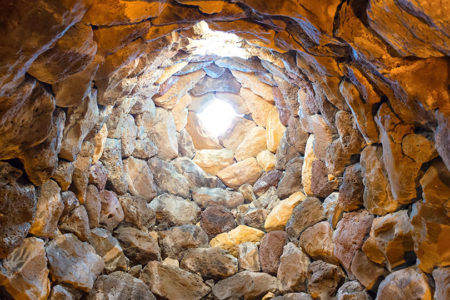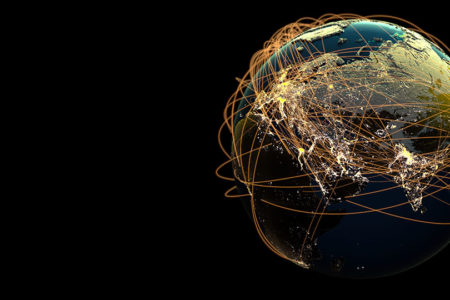Jesus Christ and the Future Kingdom of God Conclusion
We have already seen two evidences that the theocratic Kingdom has been postponed until Christ’s Second Coming. This article will examine more evidences of that postponement.
The Chronology of Matthew 24—25
In Matthew 24—25, Jesus Christ presented a chronological order of future events related to His Second Coming. In Matthew 24:29–31, He taught that after the Great Tribulation, He will come as the Son of man in the clouds of heaven with power and great glory and with His angels.
Matthew 25:31 refers to the same time as Matthew 24:30–31, namely, the coming of the Son of man in glory with the holy angels. Jesus declared that, at that time, the Son of man will “sit upon the throne of his glory” (Mt. 25:31, David’s throne as noted in the previous article); will reign as King; and will send righteous people into the theocratic Kingdom (v. 34).
Through this chronological order in Matthew 24—25, Christ revealed that He will not take His seat on David’s throne, reign as King, and send people into the promised Kingdom of God until He returns after the Great Tribulation. He thereby indicated that the theocratic Kingdom will not be established until His Second Coming.
The Order of Events at Christ’s Second Coming
In His parable of the tares, Christ taught the following order of events at His Second Coming: All the unsaved, meaning those who have not received Christ as Savior (the tares—”the children of the wicked one”—Mt. 13:38–39) and who are living on the earth at His Second Coming (“the end of the age,” v. 39) will be removed from the earth in judgment by the angels of the Son of man (vv. 40–42). Then all the saved (the good seed—“the children of the kingdom”—v. 38) living on the earth at Christ’s Second Coming will remain to enter the theocratic Kingdom (v. 43).
Christ taught the same order of events in His parable of the dragnet. At His Second Coming (“the end of the age,” Mt. 13:49), “the angels shall come forth, and separate the wicked from among the righteous, And shall cast them into the furnace of fire; there shall be wailing and gnashing of teeth” (vv. 49–50).
Jesus presented this same order again in Matthew 24:37–41. There He taught that the order of events at His Second Coming after the Great Tribulation will be the same as the order of events in Noah’s day (v. 37). In Noah’s day, the flood took all the unsaved from the earth in judgment while all the saved (Noah and his family) remained to enter the next period of history (vv. 38–39). After relating this sequence, Jesus said, “so shall also the coming of the Son of man be” (v. 39). At His Second Coming after the Great Tribulation, the living unsaved will be “taken” from the earth in judgment; and the living saved will be “left” on the earth to enter the next period of history, the theocratic Kingdom Age (vv. 40–41).
Through these teachings, Christ indicated that at His Second Coming, all living unsaved people will be removed from the earth in judgment before the future theocratic Kingdom will be established. The fact that all unsaved people have not yet been removed in judgment prompts the conclusion that the theocratic Kingdom has not yet begun.
The Parable of Luke 19:12–27
As Jesus drew near to Jerusalem shortly before His death, He spoke a parable to His disciples “because they thought that the kingdom of God should immediately appear” (Lk. 19:11). Christ talked about a nobleman who travelled a long distance “to receive for himself a kingdom, and to return” (v. 12). Because this journey required the nobleman to be away for an extended time, he entrusted portions of his wealth as stewardships to his servants. He ordered his servants to tend his wealth for his benefit until he returned to establish the kingdom he would receive while away. When he returned, he gave ruling positions in the government of his kingdom to the servants who had exercised their stewardships faithfully for his gain (vv. 13–24).
The nobleman in the parable represented Jesus Christ. Jesus was indicating to the disciples that He would go away to a faraway place (heaven) for an extended time to receive the future theocratic Kingdom. When He had it, He would return to earth to establish it. Thus the theocratic Kingdom of God would not be established immediately but would be postponed until His Second Coming.
The Daniel 7 Prophecy
Two parts of the prophecy recorded in Daniel 7:9–27 also signify that the Kingdom will not be established until the Second Coming.
First, in verses 9–14, Daniel saw God the Father (the Ancient of days) give the Messiah the following:
And there was given him dominion, and glory, and a kingdom, that all people, nations, and languages should serve him; his dominion is an everlasting dominion, which shall not pass away, and his kingdom that which shall not be destroyed (v. 14).
Verse 13 revealed that the Messiah would receive His kingdom (the theocratic Kingdom) in conjunction with His coming as the Son of man with the clouds of heaven.
Christ indicated that this part of the Daniel 7 prophecy will be fulfilled when He, as the Son of man, will come in the clouds of heaven at the end of the Great Tribulation (Mt. 24:29–30). Not until then, therefore, will He receive the theocratic Kingdom to establish it.
Second, the part of the Daniel 7 prophecy recorded in verses 21–22 and 25–27 revealed that the future theocratic Kingdom will not be established until the Antichrist (the little horn who will war against the saints) has been judged and his dominion taken away and destroyed. Since the judgment of the Antichrist and his dominion has not yet occurred, we must conclude that the theocratic Kingdom has not yet been established.
Revelation 19:11–21 signifies that the Antichrist will not be judged and his dominion taken away and destroyed until the Second Coming of Jesus Christ. Thus the theocratic Kingdom will not be established until the Second Coming.
The Repentance of Israel
In an earlier article, I noted that the future theocratic Kingdom will not be established until the nation of Israel believes the gospel of the Kingdom (the declaration that the theocratic Kingdom is at hand) and repents of its unbelief and rebellion against God and His Messiah. Neither of those events has occurred yet. As a result, the theocratic Kingdom has not been established.
Israel’s prophet Zechariah foretold the following events:
- When the armies of all the nations of the world will come against Jerusalem, the Messiah will come out of heaven.
- At that time the people of Israel will see Him and the wounds of His crucifixion in His resurrected body (Zech. 12:2–3, 9–10).
- They will recognize that the one who was rejected and crucified in His First Coming was their true Messiah and will repent (change their minds concerning Him to the point of trusting Him as their Messiah and Savior, vv. 10–14).
- In response to their repentance, God will cleanse them of their sin (Zech. 13:1); and the Messiah will destroy the armies that have come against Jerusalem (Zech. 14:3, 12–15).
- Then He will reign as King over all the earth (14:9).
These Scriptures indicate that the theocratic Kingdom will not be established until Israel repents in conjunction with Christ’s Second Coming.
The Restoration of Nature
Also in an earlier article, I noted that Christ taught that nature will be restored to its pre-fall condition when He, as the Son of man, “shall sit on the throne of his glory” and the apostles “shall sit upon twelve thrones, judging the twelve tribes of Israel” (Mt. 19:28). In Luke 22:28–30, Christ revealed that the apostles will “sit on thrones judging the twelve tribes of Israel” in His “kingdom.” Together these passages indicate that the restoration of nature will not take place until Christ and the apostles sit on thrones to rule the world in the future theocratic Kingdom.
The fact that nature has not yet been restored to its pre-fall condition prompts the conclusions that Christ is not seated on the throne of His glory and, therefore, the theocratic Kingdom has not yet been established.
A comparison of Matthew 25:31 with 24:29–31 indicates that Christ will not sit on the “throne of his glory” until His Second Coming after the Great Tribulation. Thus the theocratic Kingdom will not be established until His Second Coming after the Great Tribulation.
The Chronological Order of Revelation
The book of the Revelation presents the following order of events: (1) Christ’s Second Coming to earth to destroy the political and military forces of Satan’s domain (19:11–21); (2) the imprisonment of Satan in the bottomless pit for one thousand years (20:1–3); and (3) the theocratic-Kingdom reign of Christ for one thousand years (20:4–6). Two facts should be noted in light of this order.
First, this order indicates that the theocratic-Kingdom will not be established until Satan and his rule of the world system have been removed from the earth. We know that Satan and his rule were not removed while Christ was on earth in His First Coming or when He sat down at the right hand of God in heaven because of the following: Years after Christ ascended to heaven, Paul taught that Satan was still “the god of this age” (2 Cor. 4:4); and John declared that the whole world was still lying under the control of “the wicked one” (literal translation of 1 Jn. 5:19). Thus the theocratic Kingdom was not established during Christ’s First Coming or when He sat down at God’s right hand in heaven.
Second, this order in Revelation indicates that the theocratic Kingdom will not be established until the Second Coming of Christ.
Conclusion
The evidences here and in previous articles consistently prompt the same conclusion: The theocratic Kingdom of God is yet to come. It was not established with the nation of Israel at Christ’s First Coming.







